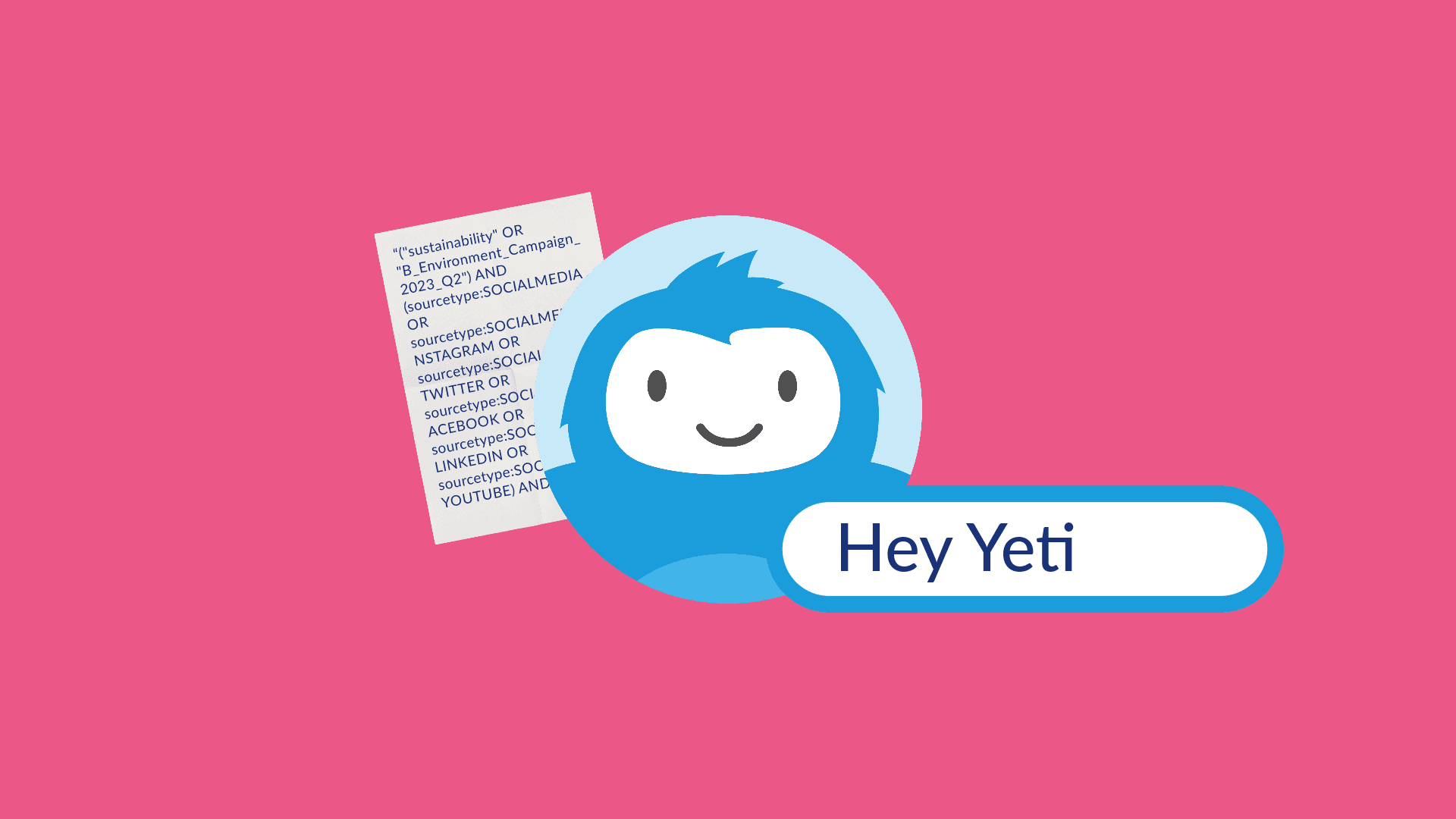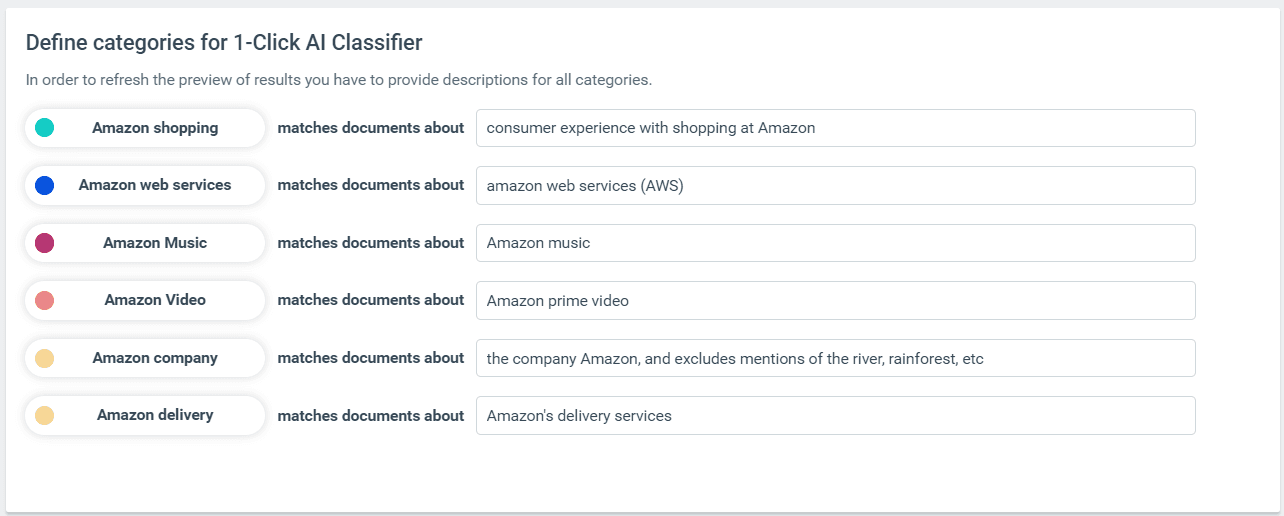Beyond Booleans: How to write the perfect social listening query
We look at the challenges of creating the perfect social listening query, and demonstrate Talkwalker's next-gen solution that could end Booleans.
November 16, 2023

Boolean queries have long been the trusted tool for social listening practitioners. However, with the explosion of social media, brands now encounter an overwhelming number of mentions of your brand. As a result, relying on creative Boolean creation to find brand mentions and effectively segment data is no longer enough.
In this blog, we provide an exploration of the intricacies of writing a good query for social listening. Moreover, we discuss the cutting-edge solution that represents the next generation answer to this prevalent industry issue. Join us on this journey to stay ahead of the curve and revolutionize your social listening strategies!
Next-generation social listening
This is part of our look at how Talkwalker is advancing social listening with the power of Generative AI. To learn more, check out our teaser below, or visit the Next Generation Social Listening hub.
{% video_player "embed_player" overrideable=False, type='hsvideo2', hide_playlist=True, viral_sharing=False, embed_button=False, autoplay=False, hidden_controls=False, loop=False, muted=False, full_width=False, width='600', height='337', player_id='85261302008', style='', color='1A9EDA', play_button_color='1A9EDA' %}
What is a social listening query?
Social listening is a powerful tool that gathers data from a diverse range of social media platforms, blogs, forums, news sites, and beyond. With this wealth of information, brands can delve into conversations about themselves, their competitors, and their industry by employing targeted queries.
While it may be easier for unique brands like Airbnb to track conversations directly related to their name, other brands face a more challenging task. A brand name such as Orange can get lost in conversations around colors or fruit. Queries around Apple, Mars, Pampers, Amazon, etc, also have the potential to pull in irrelevant mentions, making it crucial for brands to fine-tune their searches using Boolean queries.
By leveraging social listening tools, brands can gain invaluable insights and make informed decisions based on real-time data, ultimately driving their success in the dynamic digital landscape.
What are the 3 Boolean Operators?
The 3 main Booleans you can use to add more precision when building your query are:
AND
AND helps you find 2 keywords with the same mention. To find Mars chocolates, you could use:
Mars AND chocolate
OR
OR helps you incorporate synonyms into your query, if you’re not sure how consumers might discuss your product.
Mars AND (Chocolate OR candy OR sweets)
NOT
NOT allows you to exclude irrelevant topics from your conversation
Mars NOT planet
Discover how Boolean search operators are a piece of cake.
The challenge of monitoring large brands
Maintaining control of brand reputation becomes even more intricate when dealing with larger brands. The task at hand involves not only crafting precise queries to filter out irrelevant mentions but also establishing queries that monitor various facets of the brand, particularly for all-purpose businesses like Amazon.
Consider Amazon, a juggernaut spanning multiple product lines and services. To effectively monitor mentions of Amazon, we must strike a delicate balance between specificity and inclusivity when constructing the Boolean search queries.
Firstly, we must exclude any references to the Amazon Rainforest or Amazon River, which could potentially distort our results.

This example query shows the challenge a brand like Amazon could face. Already, this could generate false positives for mentions of Prime rib or the Prime drink. And miss false negatives, such as jungle toy mentions from the Amazon Marketplace.
Simultaneously, we need to segment Amazon's business into distinct categories such as shopping, streaming, delivery, and web services, each with its own unique lexicon and intricacies.
Herein lies the challenge: each segment of Amazon's vast enterprise necessitates a distinct set of keywords to incorporate into the Boolean search. For instance, when monitoring Amazon's shopping segment, it is imperative to include terms like 'buy,' 'price,' 'order,' and 'delivery.' Conversely, monitoring Amazon's streaming segment requires the inclusion of terms like 'watch,' 'stream,' 'episode,' and 'series.'
By skillfully managing these complexities and crafting well-defined Boolean queries, we can steer brand monitoring efforts to safeguard and enhance Amazon's online presence across the multitude of industries it dominates. We dive more into the challenges of segmenting social listening data here.
The problem with social listening Booleans
Creating and managing Booleans that accurately capture the nuances of diverse segments is a crucial and demanding task. It can be time-consuming. .
It's important to acknowledge that Booleans may not always be entirely reliable in delivering accurate results. When tightly constructed, they may generate false outcomes by excluding relevant results. Conversely, loosely constructed Booleans may retrieve excessive irrelevant data, requiring extensive effort to sift through the noise for the valuable insights we seek.
You should also recognize the limitations of Booleans for understanding the subtleties of human language, including sarcasm, irony, and slang. These nuances can hinder their effectiveness in extracting meaningful insights.
That’s why you need advanced techniques and tools that can complement or enhance the capabilities of Booleans to ensure accurate and comprehensive analysis of the data at hand. By doing so, we can unlock deeper insights and make informed decisions to drive successful outcomes.
How do you create the perfect Boolean?
The simple answer is, you don’t.
Introducing Talkwalker's Next-Gen Social Listening platform! We’ve advanced our platform so that our customers can use natural human language prompts to get to rich insights. Say goodbye to complex Booleans and hello to seamless data cleaning and segmentation with the help of generative AI.

An example of how Amazon can be monitored and segmented in plain language text. No Booleans required.
Enterprise businesses handling massive amounts of data can greatly benefit from this revolutionary feature. A simple sentence or two explaining your goals is all it takes to reorganize your brand mentions in minutes. Our next-gen features save users up to 40% of their time, freeing them from manual input. This allows them to focus on uncovering insights and drive impactful results for their brand.
Rest assured, Booleans are still here to refine your searches, and we wholeheartedly support their use. However, now you have an additional option that drastically reduces your time writing queries. Get ready to streamline your social listening journey with Talkwalker's new and advanced capabilities.
Conclusion
It's easy to see why Booleans have been a popular choice for social listening practitioners. However, as social media platforms evolve, creating effective Booleans has become more complex. In this age of big data, machine learning algorithms have emerged as an effective alternative to Booleans, offering more reliable and comprehensive insights into social media data.
At Talkwalker, we recognize the importance of staying ahead of the curve, and that's why we are constantly investing in cutting-edge technology to help you make better, data-driven decisions.
To learn more about all our Social Listening capabilities, click below
{{cta('91430369778','justifycenter')}}
